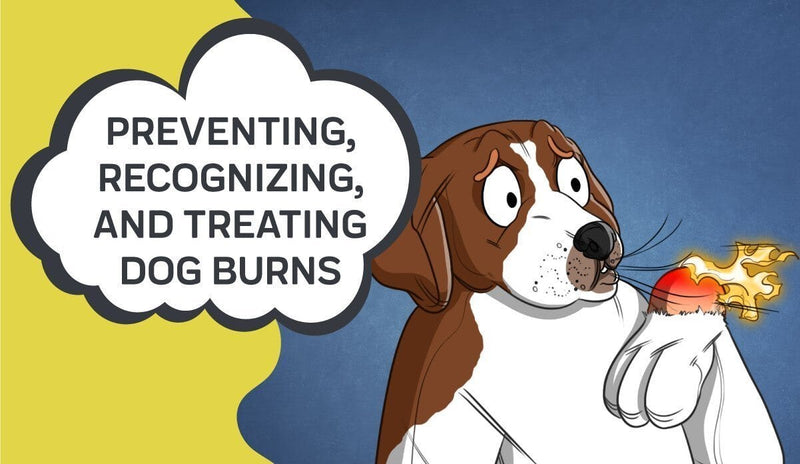- What Exactly Is Constipation?
- What Causes Constipation in Dogs?
- How To Know If Your Dog Is Constipated?
- What To Give a Constipated Dog? 10 Best Remedies To Use
- Conclusion
Like humans, your dog can also experience constipation. It is as uncomfortable for dogs as it is for humans. It is likely to put your pet in a lot of pain.
This situation is not the sort of challenge most owners want to face, but one you will have to deal with to make them feel better.
To ensure you handle the constipation issue with ease when it strikes, you need to familiarize yourself with everything about it. This preparedness includes knowing its symptoms and causes. You should also know the steps you can take to ease the discomfort and get your dog back to its usual self.
To get you started, here's an easy-to-read guide for dog constipation. We answer the pressing question - what to give a constipated dog - and the top ten remedies to get your pet on the mend.
What Exactly Is Constipation?
In medical terms, constipation constitutes severe, insufficient, or infrequent bowel movements. It is a common health issue for a dog's digestive system. Sadly, sometimes it can be difficult to notice any symptoms, leading to your pet's prolonged suffering.
One prominent symptom that always indicates the likelihood of constipation in dogs is if your pet seems to be distressed when trying to poop.
There are three types of constipation your pet is likely to suffer:
- Intraluminal: a blockage in the colon, preventing your pet from passing out stool.
- Intrinsic: hormonal imbalances or neurological problems
- Extraluminal: an outside source blocking the colon
What Causes Constipation in Dogs?
Constipation in your canine companion can be due to many factors:

- Too little or too much fiber in your dog's diet.
- Lack of exercise.
- Blockage from ingesting bones, garbage, gravel, and plastic - these materials can get stuck in the intestinal tract.
- Dehydration
- Hair ingestion from constant grooming, which can cause colon blockage
- Matted fecal hair blocking the anus due to irregular or infrequent grooming
Other not so common causes of constipation in dogs include:
- An enlarged prostate
- Neurological disorders or abnormalities such as spinal problem
- Side effects of medications
- Metabolic illnesses that lead to dehydration or electrolyte issues
- Tumor growth in the gastrointestinal tract or pelvic region
- Orthopedic pain in the dog's rear limbs
- Ingesting medications in easy to reach spots - antacids or narcotics - can also lead to bowel movement problems
How To Know If Your Dog Is Constipated?
To treat dog constipation, you first need to identify that it has this condition.
The first indication is if your dog hasn't had a bowel movement for two days or more. Another common sign is if your canine crouches or strains in pain when attempting to defecate.
Other signs include:
- Hair, grass, or other foreign objects in the stool
- Reduced appetite
- Hard, dry or small stools
- Consistently trying to lick its anus
- "Scooting" - a term used to describe your dog dragging its rear legs on the floor. This gesture happens because your dog is trying to alleviate the pressure on the anus.
- Growling, whimpering, or snarling when you touch its lower abdomen
Some of these symptoms are the same as those your pet will experience if it has a urinary tract problem. To prevent lasting damage, ensure you visit a vet as soon as possible to determine what exactly is wrong with your canine friend.
So, now to the question - what to give a constipated dog?
What To Give a Constipated Dog? 10 Best Remedies To Use
First, a sensitive stomach or lack of bowel movement not only means constipation. It could also be a sign of a medical issue that needs immediate attention from the vet.
However, no matter what, you need to ensure your dog remains calm. Your goal is to alleviate the pain, not increase it.
In some instances, gently massaging the dog's abdomen helps loosen the blockage and your dog starts stooling normally again. However, if your furry companion whimpers in pain during the massage or nothing happens, you can explore any of the following remedies to get the job done.
Here are your options for what to give a constipated dog:
Exercise
You need to get your dog out and active. Exercise is one of the best answers to the vital question - what to give a constipated dog? Especially for constipated dogs, an increase in blood flow to the colon can clear blockages.
Exercise also massages the organs of the digestive system. When your dog isn't getting enough exercise, the digestive system stops functioning correctly. The body switches to survival mode and starts to store food in the intestines and stomach. This mode leads to dry fecal matter, or in medical terms, impacted fecal matter.
Brisk exercise helps break up any impacted fecal matter. Sometimes, if the mass has accumulated for a while, your dog will need several exercise bouts to break up and pass the dry fecal matter. The dog's instincts to mark territory and smell of outdoors also encourage it to use the bathroom.
Pumpkin

Thinking of what to give a constipated dog? Pumpkins are a fantastic solution you can add to your dog's diet when treating constipation. This home remedy treats constipation and prevents a recurrence. Pumpkin is high in water, which helps soften fecal matter, and it is also a source of fiber.
It doesn't matter if you use fresh pumpkins or canned pumpkins. Some dog owners prefer canned pumpkin because all you need to do is pop the can, and your pet's treat is ready-to-eat.
There are also several tasty recipes for making pumpkin treats for your pet. However, it's best to serve it straight if you want to treat constipation in dogs.
Vitamins/Supplements
Advances in science and pet healthcare mean a wide range of organic and inorganic supplements, and vitamins help prevent and cure constipation issues in dogs. Some of these vitamins act as pure fiber sources and usually contain enzymes and folic acid.
Regarding vitamins, your vet is the best place to answer what to give a constipated dog when trying to decide which vitamins to purchase.
The Dog's Diet
Your dog's diet is everything, both in terms of nutrients and fluid intake. Best of all, fixing your dog's food is better than most constipation home remedies, especially if your furry companion suffers from constipation regularly. And if you do this successfully, you never have to worry about what to give a constipated dog.
In instances where your pet doesn't drink enough water, it can be tough coaxing them to drink it. One easy way to get your canine to drink more water is canned dog food.
Canned foods are usually high in water. You can also add water to your pet's dry food. You need to do this with care because the meal can become too soggy.
However, some vets advise against processed canned food. Canned foods sometimes contain additives that lead to hormonal imbalances. For pets suffering from regular constipation, wet food can be a great salve as its easier to digest.
While it can be expensive and time-consuming, you can also explore homemade dog food. Making your dog food yourself means ensuring it contains the right amount of minerals, nutrients, and probiotics for proper body function. You also prepare it in an environment you control.
Laxatives
Laxatives are another great solution when wondering what to give a constipated dog. You should, however, do this following your vet's recommendation. The dosage depends on your dog's weight and size.
Some popular laxative medications include:
- Psyllium: This particular laxative usually comes in powdered form and is available in almost any grocery store, pharmacy, or online store. It works by absorbing moisture from the body and using it to soften any feces in the colon. Depending on the fecal matter condition, it could take 72 hours for the laxative to take effect. When purchasing Psyllium, always go for the unsweetened or unflavored version. You should also administer it with lots of fluids or water to speed up its effects.
- Docusate sodium: Docusate sodium tablets can also act as laxatives for your pet. However, do use this with caution as an option for what to give a constipated dog. You should avoid giving your dog repeated doses if the pet isn't stooling after 24 hours. An overdose of this particular laxative can lead to stomach cramps and diarrhea. If, after 24 hours, your pet hasn't gone to the dumps, take it to see a veterinarian.
- N/B: Canned pumpkin can also act as a laxative. It is okay to mix this with food if your pet refuses to eat the plain recipe - which is what works best as a laxative. Some experts also claim that you can use human laxatives or mineral oil. You should only do that under the strict supervision of your vet. These options, especially mineral oil, can cause aspiration (oil in the pet's lungs) and be fatal if not handled properly.
Regular Potty
Sometimes, it's not about what to give a constipated dog but rather the pet's daily schedule. One of such is your pet's potty schedule. A consistent potty program is as essential as your dog's exercise routine and diet.
A great place to start is two-three potty opportunities daily. An ideal schedule would be four-six potty opportunities.
The quality of the potty time is also critical. Your furry friend should have at least ten minutes for each potty. You need to ensure you are not rushing to get anywhere, as your pet will pick up those vibes and find it difficult to relax and go to the toilet.
Also, study your pet to know what it prefers - some dogs prefer to use gravel, while some would only defecate behind shrubs or hide in tall grass. Each pet behaves differently, so find out what works and build it into your potty schedule.
Regular Feeding Schedule
Just as a regular potty schedule helps prevent constipation, feeding your pet at regular intervals also helps constipation issues. A consistent feeding schedule regulates your pet's stooling as well. To take advantage of this, try to feed your furry companion at the same time two-three times daily.
Aloe Vera Juice
Another great solution when thinking of what to give a constipated dog is aloe vera juice. It acts as a mild laxative for humans and animals. The syrup, extracted from the leaves of the aloe plant, when mixed with your pet's water or food, can instigate movement of the bowels.
It also has anti-inflammatory properties that calm and soothes any discomfort in the gastrointestinal tract due to constipation or dry fecal matter.
Apple Cider Vinegar (ACV)
ACV is another excellent option for canine owners wondering what to give a constipated dog. It is safe in minimal quantities and improves your pet's healthy gut bacteria. It's a natural remedy, made from fermented apple juice and should be one of your home remedies for constipation.
Ginger Herbs
Herbs such as ginger can be excellent when wondering what to give a constipated dog. Popularly called "the warming herb," ginger increases the generation of heat in the dog's digestive system, hastening the digestion process.
While it's not an option that would regularly come to mind if you were thinking of what to give a constipated dog, it is a great natural option for treating constipation issues.
What Can Happen If Your Dog's Constipation Is Untreated?
Leaving your pet's constipation issues untreated can lead to obstipation. Obstipation occurs when your pet can't go to the toilet on its own. This condition can lead to appetite loss, blood in the anus due to continuous straining, and vomiting.
Conclusion
For most pet owners, constipation will be a common theme. However, you need to know what symptoms to watch out for and what to give a constipated dog. On the other hand, if you can design a process that prevents your pet from suffering constipation, that would be the preferred option both for you and your pet.
















